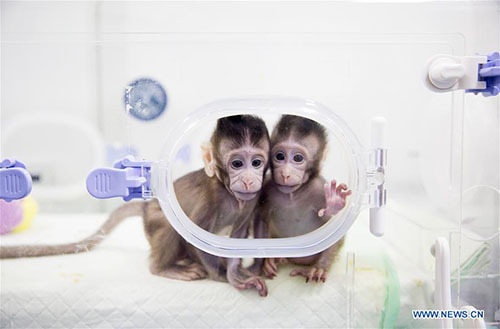
Two cloned macaques named Zhong Zhong and Hua Hua are seen at the non-human-primate research facility under the Chinese Academy of Sciences (CAS) on Jan. 22, 2018. (Photo: Xinhua)
Chinese netizens mocked The New York Times (NYT) for "moral kidnapping" against China and double standards for the shortage of lab monkeys to develop COVID-19 vaccines and the ban on the sale of wildlife.
The NYT article, published on Tuesday, claimed that millions of human lives all over the world were at stake because the development of future vaccines depends on monkeys used as test subjects, but monkeys are currently in short supply. The report said pharmaceutical companies like Moderna and Johnson & Johnson need the animals to develop their COVID-19 vaccines. But as the coronavirus swept across the US last year, there were few of the specially bred monkeys to be found anywhere in the world.
"The world needs monkeys, whose DNA closely resembles that of humans, to develop COVID-19 vaccines. But a global shortage, resulting from the unexpected demand caused by the pandemic, has been exacerbated by a recent ban on the sale of wildlife from China, the leading supplier of the lab animals," it said.
The report enraged Chinese netizens who pointed out that China had issued an announcement on the prohibition of the trade of wild animals in early January 2020 to prevent the spread of the virus.
The announcement required that wild animal breeding areas should be isolated, and the spread, transfer and sale of wild animals should be strictly prohibited.
"It is not the 'recent' ban noted by The New York Times," many netizens highlighted.
Some netizens ironically said that "China should accept imported trash, China must sell monkeys … the US has so many demands on China."
Criticisms on the report's moral kidnapping against China by establishing connections between China's lab monkey exports with the safety of millions of lives have been flooding Twitter-like Sina Weibo platform.
Such logic is similar to another report published by The New York Times in January, which quoted the chief executive of Impossible Foods, a company that develops plant-based alternatives to meat products saying that "every time someone in China eats a piece of meat, a little puff of smoke goes up in the Amazon." For this reason, China is an absolutely essential and extremely important market for the company.
American scientists have searched private and government-funded facilities in Southeast Asia as well as Mauritius, a small island nation off Southeast Africa, to stock on their preferred test subjects, rhesus macaques and cynomolgus macaques, also known as long-tailed macaques. But no country can make up for what China previously supplied, The New York Times report said.
Before the pandemic, China provided over 60 percent of the 33,818 primates, mostly cynomolgus macaques, imported into the United States in 2019, according to analyst estimates based on data from the Centers for Disease Control and Prevention, said the NYT article.
Media reports showed that besides China, research monkeys are also sourced from Cambodia, Mauritius and Vietnam. In 2014, India banned the export of monkeys to the US, the largest buyer, greatly reducing experiments on monkeys.
Nevertheless, The New York Times report admitted that the US had to bear some responsibility for not having enough research monkeys as the budget for the national primate center has remained unchanged or decreased for well over a decade.
Double standard
In fact, laboratory monkeys are also really hard to get in China. Macaques and crab-eating macaque are two main kinds of laboratory monkeys. The latter has become a nominating kind of laboratory monkeys since 1970's as they can reproduce fast and are small in size thus requiring a comparatively small doses of drugs during experiments.
However, China has no wild crab-eating macaques and has to import specimens from other countries and start from zero to breed them.
According to media report, South China's Guangdong Province is the first place in China that has imported crab-eating macaques from the Philippines since 1990. China has also imported crab-eating macaques from other South Asian countries like Vietnam and Cambodia.
After the COVID-19 epidemic broke out, the demand for laboratory monkeys even roared. In February 2020, Chinese authorities made emergency arrangements for batches of laboratory monkeys for experiments on anti-coronavirus drugs.
The best laboratory monkeys are around two years old and are bred by Chinese companies. Most of these monkeys have actually been purchased by international companies and exported to the US. "Since the second half of 2019, the price of laboratory monkeys increased from 15,000 yuan ($2,323) to 62,000 yuan ($9,600) each. It is really hard to get laboratory monkeys," Ren Jin, director of the Center for Drug Safety Evaluation under the Shanghai Institute of Material Medical, Chinese Academy of Science, told yicai.com.
There were about 40,000 monkeys used in laboratories in China in 2012, but some of them were illegally bred, according to a report from yicai.com in 2012. The Chinese forestry authorities have been cracking down on such illegal breeding.
South China's Guangxi Zhuang Autonomous Region is the biggest exporter of lab monkeys in China. However, according to a report from China News Service, since February 2017, the export volume of the regions' lab monkeys has been impacted due to overseas trade protectionism and pressure from some animals rights organizations.
In 2019, the Trump administration imposed a 15 percent levy on $300 billion worth of Chinese imports, including nonhuman primates, as part of the US launched trade war.
Chinese netizens said that, considering the US' double standard, it will be China's fault anyway no matter China exports lab monkeys or not.


